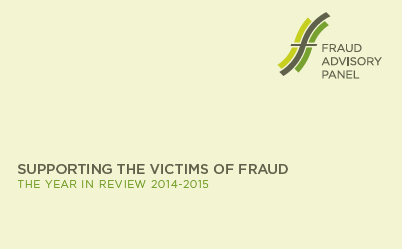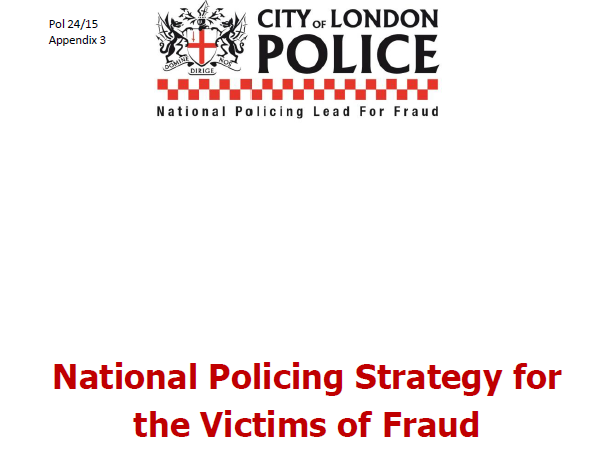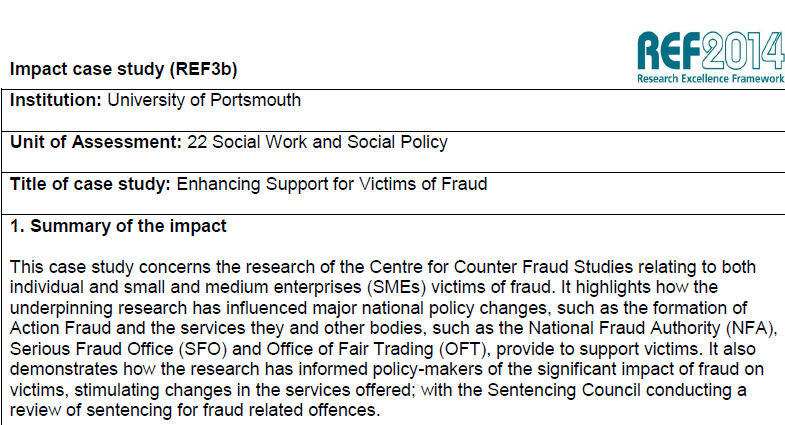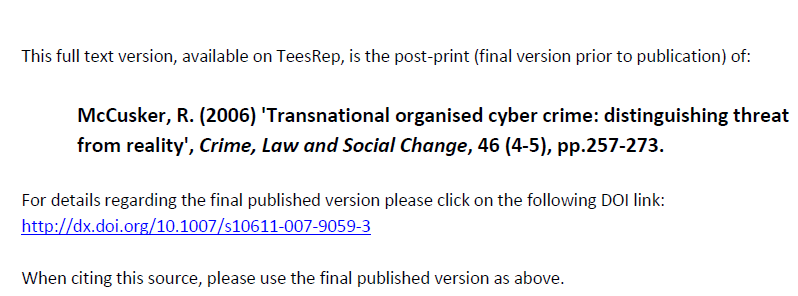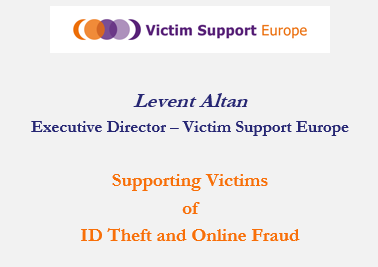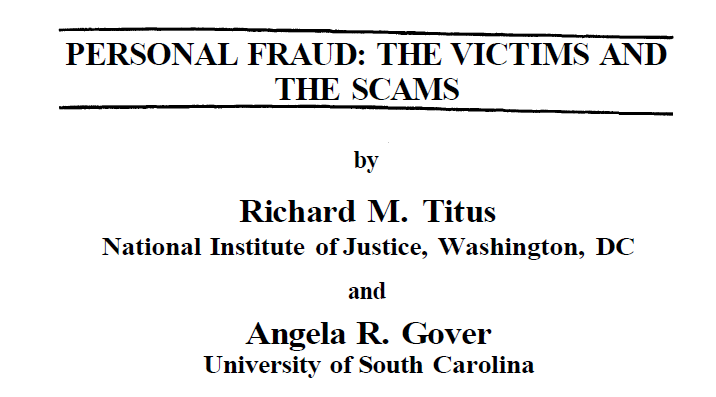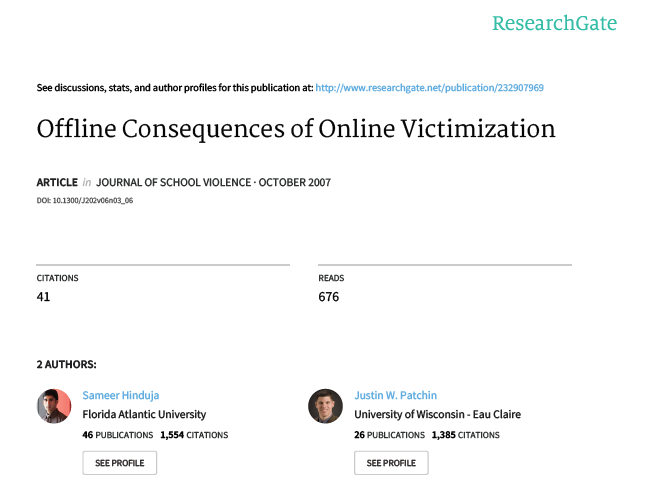For a quick search in the Knowledge database below, please use the search box. Also, note that using one or more of the dropdown filters will optimise your search.
Watch this video to find out more about our Knowledge Database and the publications we have collected here for you: video
Knowledge Database
-
Only the tip of the iceberg: Fraud against older people
AgeUK | Published in 2015
Keywords: fraud, old people, victimisation -
Supporting the victims of fraud: the year in review 2014-2015
Fraud Advisory Panel | Published in 2015
Keywords: fraud, prevention, victim services -
National Policing Strategy for the Victims of Fraud
City of London Police | Published in 2015
This is the National Policing Strategy for the victims of fraud, produced by the National Police Coordinator for Economic Crime (NPCEC). We are developing this through the Crime Business Area in consultation with chief police officers and their staff. It is part of the national policing strategy for fraud and is designed to assist chief officers in delivering the most appropriate support to victims of fraud in their community. This document is best read in the context of the National Policing Fraud Strategy which set out the aim of reducing the impact of fraud (its volume, value and impact on people). Where policing failed to protect the community from fraud it set the objective of “supporting victims of fraud ensuring that they receive an appropriate service from policing in partnership with other agencies such as Victim Support and other Government departments (such as Social Services)”.
Keywords: fraud, victim services -
Enhancing Support for Victims of Fraud (case study)
his case study concerns the research of the Centre for Counter Fraud Studies relating to both individual and small and medium enterprises (SMEs) victims of fraud. It highlights how the underpinning research has influenced major national policy changes, such as the formation of Action Fraud and the services they and other bodies, such as the National Fraud Authority (NFA), Serious Fraud Office (SFO) and Office of Fair Trading (OFT), provide to support victims. It also demonstrates how the research has informed policy-makers of the significant impact of fraud on victims, stimulating changes in the services offered; with the Sentencing Council conducting a review of sentencing for fraud related offences.
Keywords: fraud -
Transnational organised cyber crime: distinguishing threat from reality
McCusker, R. | Published in 2006
Cybercrime has become an integral part of the transnational threat landscape and conjures up pressing images of nefarious and increasingly complex online activity. More recently, the concept of „organised crime‟ has been attributed to cybercriminality. There has been subsequent disagreement and confusion concerning whether such crime is a derivation of traditional organised crime or an evolution of such crime within the online space. This opaque state of affairs has been exacerbated by the relative lack of clear evidence attesting to and supporting either scenario. Technological advances have always been used to the advantage of the criminal fraternity. The crucial question that remains is whether those advances have merely facilitated the commission of physical crime or whether in fact they have led to the creation of a new wave of traditional, but virtual, organised crime.
Keywords: cybercrime, fraud -
Study on the Effects of New Information Technologies on the Abuse and Exploitation of Children
Keywords: children, prevention, victimisation -
Personal fraud: The victims and the scams
The evidence from fraud victimization surveys is unanimous that repeat victimization is common. Greater education is not a protective factor against victimization; the evidence points to the reverse. Much evidence also suggests that older people are not at greater risk of fraud victimization. It may be that younger and better-educated people have wider interests, engage in a broader range of activities, and have more consumer participation in the marketplace than other demographic groups, thereby increasing their exposure to fraudulent solicitations and transactions. Risk heterogeneity and state dependence both appear to contribute to repeat victimization. The present study finds that fraud attempts are less likely to succeed if: (1) the offender is a stranger; (2) the initial contact is by telephone or mail; (3) the potential victim has heard of this type of fraud before; or (4) the potential victim tries to investigate the person or proposition before responding. Targeted campaigns aimed at fraud victims should be mounted. Enhanced and routine data collection on a national level is necessary, together with anticipation of new methods of fraudsters.
Keywords: fraud, victimisation -
Challenges of responding to online fraud victimisation in Australia
Australian Institute of Criminology | Published in 2014
Online fraud occurs when an individual or a business responds in some manner to an unsolicited invitation received via the internet and suffers financial or other detrimental effects as a result. In 2010–11, the Australian Bureau of Statistics (2012) found that over 1.2 million Australians (6.7% of the population aged 15 years and over) had been a victim of personal fraud, losing approximately $1.4b in the preceding 12 months. More than half of these victims (55.7%) were contacted via the internet or email (online victimisation). In addition to monetary losses, victims of online fraud suffer serious psychological, emotional, social and even physical problems as a consequence of their victimisation. This paper explores the challenges of responding to online fraud victimisation in Australia and describes some of the specific support services that have recently emerged to support victims of this crime.
Keywords: fraud, victimisation -
Offline Consequences of Online Victimization: School Violence and Delinquency
Sameer Hinduja, Justin W. Patchin | Published in 2007
As increasing numbers of youth embrace computer-mediated communication to meet academic and social needs, interpersonal violence directly and indirectly related to the Internet is occurring more often. Cyberbullying in particular has shot to the forefront of agendas in schools and communities due to the emotional, psychological, and even physical harm to which victims can be subjected. While previous studies have focused on describing its frequency in an exploratory capacity, the current work seeks to utilize general strain theory to identify the emotional and behavioral effects of cyberbullying victimization. Data collected online from a sample of adolescent Internet-users indicate that cyberbullying is a potent form of strain that may be related to involvement in school problems and delinquent behavior offline. Implications of these findings and suggestions for policy are discussed.
Keywords: fraud, mental health

